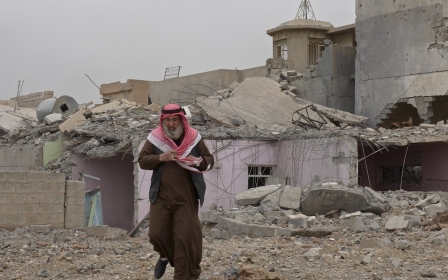Iraqi army nears symbolic Mosul mosque as strike kills foreign militants

Iraqi army helicopters strafed and rocketed Islamic State (IS) positions inside Mosul's Old City on Sunday as ground troops fought fierce street battles to close in on the strategic prize of the al-Nuri Mosque.
An air strike by the US-led coalition backing Iraqi forces in their campaign to retake Mosul also killed six foreign militant commanders in the west, including a Russian who was a senior IS leader, Iraq's defence ministry said.
Federal Police troops on Sunday advanced past the train station in western Mosul close to the mosque, where IS leader Abu Bakr al-Baghdadi declared a caliphate in July 2014 after the hardline militants had seized swathes of Iraq and Syria.
Residents fled from the area, carrying suitcases and bags of belongings and picking their way through the wrecked buildings as shells and gunfire echoed behind them. Most of them were women and children.
"Federal Police and Rapid Response forces resumed their advance after halting operations amid bad weather. The troops have a target of retaking the rest of the Old City," a police spokesman said.
The battle to recapture IS's last stronghold in Iraq has now entered its sixth month. Iraqi government forces, backed by US advisers, artillery and air support, have cleared the east and half of western Mosul and are now focused on controlling the Old City.
Recent fighting has targeted the centuries-old al-Nuri Mosque, with its famous leaning minaret. Its capture would be a blow for IS as it was from there that Baghdadi declared himself head of his self-proclaimed caliphate.
US officials estimate about 2,000 IS militants remain inside Iraq's second-largest city, resisting with mortar fire, snipers and suicide car bombs that plough into army positions.
The black IS flag still flew from the mosque's minaret on Sunday.
Iraq's defence ministry said in a statement a coalition air strike destroyed a command centre, killing Russian leader Abdul Kareem al-Rusi, head of the Tareq Bin Ziyad brigade, as well as a British-Algerian, a French-Syrian, a Turkish commander and two fighters from Morocco.
Federal Police moved in on foot from near the train station toward the Old City, forging ahead through rubble-filled streets.
Police commander General Khalid al-Obedi told reporters on the frontline: "We are advancing toward the Old City. Their resistance is weakening. They are mostly using car bombs and that shows they are losing on the ground."
He barked orders into his radio as mortar rounds landed beyond his position.
Reporters saw an air strike hit IS positions about 300 metres ahead on the frontline. Helicopters circling overhead fired rockets and raked the ground with machine gun fire.
Federal police also arrested Husam Sheet al-Jabouri, the local chief of Diwan al-Hisba, an IS unit responsible for enforcing strict Islamic rules, in Mosul's Bab al-Sijin area, a police statement said.
As fighting has entered into the narrow alleyways and densely populated parts of west Mosul, more residents are fleeing from liberated areas where food and water are scarce and homes are often caught in shelling.
Families with elderly relatives and children marched through western Mosul's muddy streets, past buildings pock-marked by bullet and bombs on Saturday. Some said they had hardly eaten in weeks, scrambling for supplies handed out by a local aid agency.
"It is terrible, Islamic State have destroyed us. There is no food, no bread. There is absolutely nothing," said one resident.
As many as 600,000 civilians may be caught inside the city with the militants. About 255,000 people have been displaced from Mosul and surrounding areas since October, including more than 100,000 since the military campaign in western Mosul began on 19 February, according to United Nations figures.
The last week has seen the highest level of displacement yet, with 32,000 displaced between 12 and 15 March.
Stay informed with MEE's newsletters
Sign up to get the latest alerts, insights and analysis, starting with Turkey Unpacked
Middle East Eye delivers independent and unrivalled coverage and analysis of the Middle East, North Africa and beyond. To learn more about republishing this content and the associated fees, please fill out this form. More about MEE can be found here.




